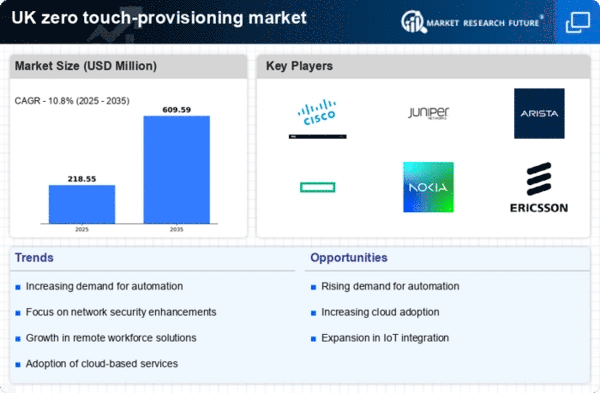Increased Focus on User Experience
An increased focus on user experience is emerging as a significant driver in the zero touch-provisioning market. As organisations strive to enhance customer satisfaction, the need for seamless and intuitive device provisioning processes becomes critical. Companies are recognising that a positive user experience can lead to higher retention rates and improved productivity. In the UK, businesses are investing in zero touch-provisioning solutions that prioritise user-centric design, ensuring that end-users can easily access and configure their devices without technical assistance. This shift towards user experience is likely to propel growth in the zero touch-provisioning market, as organisations seek to differentiate themselves in a competitive landscape.
Rising Demand for Remote Management
The zero touch-provisioning market is experiencing a notable surge in demand for remote management solutions. As businesses increasingly adopt remote work policies, the need for efficient device management without physical intervention becomes paramount. This trend is particularly evident in sectors such as IT and telecommunications, where the ability to deploy and manage devices remotely can lead to significant cost savings. According to recent data, the market for remote management solutions is projected to grow by approximately 25% annually, indicating a robust appetite for zero touch-provisioning technologies. This rising demand is likely to drive innovation and investment in the zero touch-provisioning market, as companies seek to enhance operational efficiency and reduce downtime.
Technological Advancements in Networking
Technological advancements in networking are playing a pivotal role in shaping the zero touch-provisioning market. Innovations such as Software-Defined Networking (SDN) and Network Function Virtualization (NFV) are facilitating seamless integration of zero touch-provisioning capabilities. These technologies enable more agile and flexible network management, allowing for rapid deployment and configuration of devices. As the UK continues to invest in next-generation networking infrastructure, the zero touch-provisioning market is likely to benefit from these advancements. The integration of AI and machine learning into provisioning processes further enhances efficiency, suggesting a promising future for the zero touch-provisioning market as organisations seek to leverage cutting-edge technologies.
Cost Efficiency and Resource Optimization
Cost efficiency remains a critical driver in the zero touch-provisioning market. Businesses are increasingly recognising the financial benefits associated with automating device provisioning processes. By minimising manual intervention, organisations can significantly reduce operational costs, which is particularly relevant in the current economic climate. Studies indicate that companies implementing zero touch-provisioning can achieve up to 30% savings in deployment costs. This financial incentive is compelling for many UK businesses, prompting them to invest in zero touch-provisioning solutions. Furthermore, resource optimisation through automation allows IT teams to focus on strategic initiatives rather than routine tasks, thereby enhancing overall productivity and effectiveness in the zero touch-provisioning market.
Regulatory Compliance and Data Protection
Regulatory compliance and data protection are increasingly influencing the zero touch-provisioning market. With stringent regulations such as the General Data Protection Regulation (GDPR) in place, organisations must ensure that their provisioning processes adhere to legal standards. This compliance requirement drives the adoption of zero touch-provisioning solutions that incorporate robust security measures and data protection protocols. In the UK, businesses are prioritising solutions that not only streamline provisioning but also safeguard sensitive information. The emphasis on regulatory compliance is likely to foster growth in the zero touch-provisioning market, as organisations seek to mitigate risks associated with non-compliance and enhance their overall security posture.
















